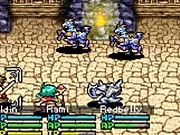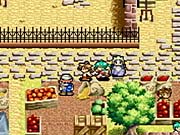It's become clear by now that the Game Boy Advance is like a refuge for near-extinct genres of games, such as 2D side-scrollers and traditional console role-playing games. RPGs are particularly well suited to the system, and the GBA's got a good number of high-quality ones already, including originals like Golden Sun and Tactics Ogre: The Knight of Lodis, as well as accurate translations of classics like Phantasy Star Collection and Breath of Fire II. Now another recognizable RPG series has found its place on Nintendo's handheld. And while Lufia: The Ruins of Lore may appeal to hard-core fans of the series or the genre, it's mostly a straightforward RPG that's not recommendable over the competition.

If you've ever played a 16-bit-era console RPG before, you'll be in very familiar territory with Lufia: The Ruins of Lore. It's the story of three young friends--Eldin, Torma, and Rami--who leave their humble village in search of adventure and, sure enough, find themselves embroiled in an epic plot, and the fate of the world is on the line, and there's an evil villain...that sort of thing. You control Eldin and company from a top-down perspective, guiding whoever's in your party at the time through various towns, dangerous wilderness areas, caves, and so on. Later on, the plot thickens and you'll visit some places that aren't quite as conventional. You'll be fighting monsters all throughout the game, however, and combat is turn-based and slow and can therefore be very tedious.
Combat involves choosing an action for up to four characters--you can fight or use magic, an item, or sometimes a special ability. There's your standard sort of elemental system here, so fire-based enemies can be seriously hurt by water-based attacks, and so on. The fighting isn't terribly strategic, and more than anything, it's just sluggish. You'll see your characters and their foes go through the same animations over and over, and defeating even the most trivial of enemies seems to take longer than it should. The pacing of the combat really hurts this game.
Too bad, because Lufia: The Ruins of Lore does a pretty good job of avoiding some of the other pitfalls that many RPGs fall into. For example, there are no random encounters. In most RPGs, you're walking along, and suddenly the game switches to a combat screen--which can be maddening. In Lufia, you see your enemies on the field and can try to slip past them. You can even gain initiative if you manage to attack them from behind, though they'll get a free attack themselves if they do the same to you. At any rate, combat for the most part is unavoidable. Lufia: The Ruins of Lore is quite difficult, so you'll often need to go out of your way to just keep fighting in order to level up--a process made especially cumbersome because of the combat system's pace.
Lufia has other good qualities as well. In stark contrast to the combat, you can run around from the top-down perspective nice and fast, and each of the game's main characters also has a special ability for interacting with the environment. The combat also has some nuances. You can use special disks to try to capture most any creature you run into--these creatures can then be used as a party member and can level up and equip items just like the rest of your team. These creatures can even evolve into more powerful forms, and occasionally, one of your main characters can merge together with a creature to become stronger still. Additionally, Lufia: The Ruins of Lore has a simple but fairly entertaining job system--your characters can become fighters, mages, alchemists, and more, which doesn't affect their appearance but does affect their core stats and determines which new abilities they'll gain as they earn experience points. You can master various jobs and eventually create a well-balanced party of powerful, multitalented characters. It's just that you'll have to slog through lots and lots of dreary battles to get there.

As mentioned, this isn't an easy game, not even in the beginning. In fact, Lufia: The Ruins of Lore is actually rather punishing, because it only lets you permanently save your progress in areas like towns, which can be few and far between. There's a quick-save feature so that you don't have to lose your progress if you suddenly need to stop playing--but the quick save is automatically deleted when you continue, and if your party in Lufia is wiped out, you lose all your progress since your last permanent save. The combat isn't much fun to begin with, so getting trounced by a powerful boss and having to navigate a straightforward enemy-infested dungeon all over again just to give it another go can be very disheartening indeed.
Then again, hard-core fans of console RPGs are no strangers to these sorts of trials and tribulations, and so Lufia: The Ruins of Lore can certainly keep them busy for a while. It's a lengthy adventure, and there's some replay value to be found in the job system, in the monster-catching feature, as well as in the Ancient Cave, a randomized multistory dungeon that you can repeatedly work your way through in order to gain experience and find loot. Lufia looks and sounds merely decent; the character art looks pretty good, but there's some inexplicable slowdown in the top-down perspective. A grating noise accompanies all the dialogue, and the battle music gets as tiresome as the battles themselves. These and various gameplay issues make Lufia: The Ruins of Lore a less-than-stellar RPG, though it's certainly competent, so undiscriminating fans of the genre who've played most other GBA RPGs already might as well give it a go.